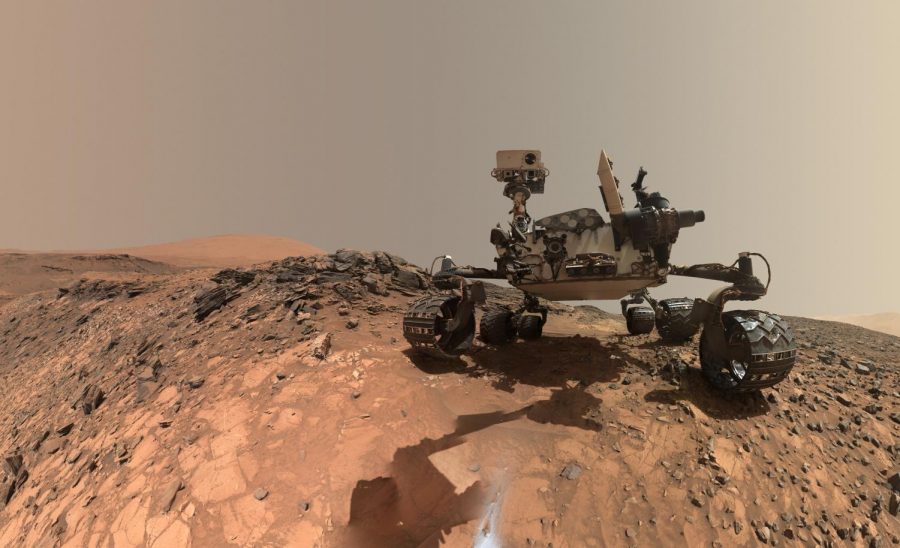A golden opportunity
Saying goodbye to our space dog
March 1, 2019
When the National Aeronautics and Space Administration — or NASA — launched a pair of rovers on July 7th of 2003, they never believed their mission would last as long as it did. Spirit and Opportunity landed on Mars in January of 2004 and began collecting data to send back to NASA headquarters. At this point, the mission was only expected to last about 90 days, and after a glitch with Opportunity’s heaters that caused one to remain on and drain her battery, they had no reason to believe otherwise.
But they worked feverishly to figure out a solution and learned that if Oppy (an endearing name many have given Opportunity) went into a deep sleep mode where she didn’t use any heaters at all, the power of the sun could reheat her every morning to let her continue without losing battery. Every time another problem popped up, headquarters worked to solve it- whether it be a wheel taking too much of the weight of her golf cart sized stature or her twin Spirit getting caught in a sand pocket. Sadly, in 2010, Spirit ended her own mission after getting caught again in a sand pocket that she couldn’t find her way out of before winter hit, effectively freezing her to death.
Throughout the years that Spirit and Opportunity researched we’ve learned a lot about the possibility of life on Mars, one of their primary goals by traveling across months worth of empty space. Not only did they come to learn that Mars had land features and other evidence that water most likely once existed on the planet, they also came to learn that the planet also had a hydrothermal system, essentially a power source for the planet.
This proved that Mars has at least two of the required characteristics of a planet to be habitable. They also taught us about the climate on Mars and the composition of different compounds found there, giving us a stronger picture overall of what life on Mars would look like.
Now, nearly 15 years after the initial mission launch, the entire world drew in a breath of heartache when news broke that Oppy’s mission was over. In June of 2018, Oppy caught herself in a sandstorm that rendered her solar panels useless. Assumably, after being unable to refill her battery, Oppy ceased working not too long after communications cut off in June. However, NASA didn’t want to give up, and continued to send transmissions in an attempt to salvage the rover. Despite their hardest efforts, it simply was her time to go. On February 13th of 2019, NASA officially ended the rovers mission.
Opportunity’s death struck a chord with scientists and simple space lovers alike. At the surface, being sad over more than just the scientific losses that come from Oppy’s death seems immature or stupid. However, Oppy’s life, as well as her sister’s, stood for something more than many people realize. When the rovers were preparing to launch in 2003, NASA opened an essay contest to name them. The winner, hopeful future astronaut Sofi Collis, was a third grader living in Arizona. Before being adopted by her family, Collis was an orphan living in the city of Siberia in Russia. In her essay, she explained that looking up and seeing the night sky sparkling made her feel like she could fly out into space herself, and that now she was in America, she had “Spirit” because of her “Opportunity”.
Collis’ story isn’t alone. Many people interested in a career in space, and even those who simply enjoy looking up at the night sky, felt like Oppy represented the unlimited potential in their lives. Simply knowing that it’s possible for a huge space rover to live nearly 60 times longer than expected is enough to give anyone hope. Oppy and Spirit’s humanization also contributed to people’s sentimentality of them. In the last few communications received from Oppy, NASA was able to learn that Oppy’s sensors realized that there was a lack of light and that the battery was low. But in their release of the final transmission, NASA told us that Oppy said that “my battery is low and it’s getting dark”.
Although essentially this information is the same, the human interpretation of the data was heartbreaking and chilling to anyone reading. Their last attempted transmission to Oppy was just as devastating- sending the song I’ll Be Seeing You by Billie Holiday. With their final attempt at communication, tears fell in the mission room, hugs were given for a successful mission, and smiles for the information they now know- but no one was fully happy. This mission end was bittersweet.
In the words of Billie Holiday, “I’ll find you in the morning sun / And when the night is new / I’ll be looking at the moon / But I’ll be seeing you”. Losing Opportunity was devastating. Hopefully, thanks to what we’ve learned from her, we can move forward to other missions with a stronger goal and sense of what we’re searching for. Although Opportunity has been one of the longest rovers to last on Mars, she is survived by many rovers from other countries, as well as some from NASA, including the Curiosity rover. As we listen to millionaires talk about their goal to live on Mars one day, we understand that it’s story is not over just yet, even if Opportunity’s is.



